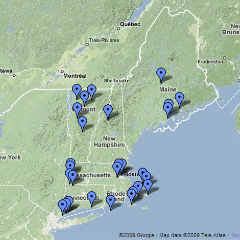January 12th, 2013 Brian Herzog
 This reference question happened before Christmas. As I came into work one afternoon to start my evening shift, the staff person I was replacing had to pass off to me a patron she had already been helping for a little while.
This reference question happened before Christmas. As I came into work one afternoon to start my evening shift, the staff person I was replacing had to pass off to me a patron she had already been helping for a little while.
The patron was looking for an article she had read in the Lowell Sun (a local daily newspaper) within the last couple months - she couldn't remember the title, author, or date, but knew it had something to do with with how changes in Social Security will affect the pension the spouse of a state employee will receive.
The patron had called the newspaper and they told her they didn't know exactly which article it was, but it probably would have run on a Thursday.
When I came in, the patron was going through a stack of newspapers, looking at Thursdays issue-by-issue, working backwards. My coworker had already spent time searching our Lowell Sun subscription database, but neither approach was succeeding.
After my coworker left, and since the patron was still using the physical newspapers, I thought I'd try again with the database. Different people use different search techniques, so perhaps (and hopefully) I'd find something my coworker missed.
I started with just keyword searches for combinations of "social security" "pension" "spouse" and a few other things, limited to the last 3 months, but none of the results really seemed to fit the patron's description. I opened it up to six months, then removed the date limiter all together, and still nothing. Then I stopped combining keywords, and just searched the individually - still nothing.
I knew the database wouldn't contain AP stories or articles from other sources, but the patron was pretty sure it was a regular column of a local writer. She knew what he looked like too (from his headshot running along side each column), so she was hoping that she could at least find one of his columns and then we could get his name.
Since I wasn't having any luck in the subscription database, I thought I'd try their website's searchable archive - it's not full-text, but an index of authors and titles could still be helpful. However, the only thing coming up were the same articles I'd already seen - and the website said "Generally, the material is current 24 hours after publication," so it should have been up-to-date with no embargo.
Just then, the patron came over very excited - she recognized the columnist's picture in one of the papers. It wasn't the right article, but at least we now had his name: John Spoto.
While she was looking over my shoulder, I searched the database for author/byline=John Spoto, and oddly, only two matches came up. Odd because there were so few for a regular columnist, and because they were both dated July 2012. I did a keyword search instead of an author search for his name, and then got 55 results - much better (however, slightly annoying).
But we still had a catch, because the most recent was dated September 9th. The patron was sure the article she read was more recent than that, but no matter what I tried I couldn't find any other articles by this person in the database (nor on the website, which indicated it was current).
However, when I started reading the dates - September 9th, August 26th, July 29 - I noticed that most were Sundays. Because the paper had told her this column ran on Thursdays, she had only been looking at Thursday's papers. So, the patron went back to check the Sunday editions, and hit the jackpot on Dec 2nd.
The column was titled "Public pensions do affect Social Security benefits," by John Stopo. We both thought it was odd this didn't come up in the database, so I tried searching by the title - guess what? No luck.
It looks like the database hasn't been updated in awhile, at least for this writer's columns.
Regardless, I helped the patron photocopy the column*, and while we were doing that she talked about the importance of perseverance and how you can do great things by taking only little steps at a time. It seemed to me that, in this case, the work the patron put into finding the article made it that much better when she did find it - if she came in and found it right away, it would have been a whole different experience.
Not that things need to be difficult, but it's nice to appreciate the results of extra effort.
*Helping patrons photocopy odd-sized newspaper articles, that don't readily fit on legal-size paper, is a reference question unto itself.
Posted under Uncategorized | 2 Comments »
May 28th, 2011 Brian Herzog
I was all proud of myself for ultimately finding the answer to this question - but afterward I discovered the answer wasn't nearly as hard to find as I had thought. Oh well.
A patron came up to the desk and pushed this newspaper clipping towards me (click to read it):
As she did this she said,
This from the Wall Street Journal page A12, but I can't remember date. I looked through all the issues you have, but it's not in any of them. You need to find out when is this article from because I want to read the rest of it. I'll leave this with you and go back to my computer, so just bring it over when you find it.
We keep the last three months of the WSJ in print, and since she said she looked at every issue, that ruled out anything between now and March 2011. I asked her if she had any idea when she photocopied it, and she said she thought it was in March, but it could have been a little earlier, so I decided to focus my search between January and March 2011.
Unfortunately, we don't have subscription database access to the WSJ, so I went to their website to see what kind of archive search they had. Their search did allow limiting to a date range, so I combined that with what seemed like the most important keywords from the article (Victim Funds, Columbine High School, Virginia Tech, Von Mour, etc) - and came up empty.
I usually don't have much luck with newspaper searches, so I quickly switched to Google - sometimes their cached results contain a better record of what has been published (or at least a temporary view through paywalls), and I'd be happy if I could even just get a citation. I searched on various iterations of those same keywords, and included the "site:wsj.com" limiter, but still had no luck.
I thought I was on the right track, but just using the wrong keywords, so I reread what I could of the article, looking for something unique. Towards the top of the page is a photo caption listing peoples' names, so I tried another Google search for "victim funds" "dan smolnik" site:wsj.com and got exactly one hit.
Clicking into the article and skimming it, I saw the same "Victim Funds" table, and also did a Ctrl+F for the phrase "As many as 4.62 points," which appears at the bottom of the clipping, so I knew this was the right article.
So yay, that made me happy. I scrolled back up to the top to find the date: March 28, 2010. Wow, the patron had the right month, but the wrong year.
I went over to the patron's computer and pulled up the article for her. At first she was skeptical because of the year, but when I showed her the table and the same paragraphs from the clipping, she agreed it must be the same one.
After getting back to the desk, I felt pretty proud of myself for being able to unearth this based on such a fragment of a clipping - no title, no author, no date. But I was curious if the search on the WSJ website would have found the man's name. I tried it, and it didn't - until I remembered to expand the time frame to 2 years, and then it did.
I also found success searching on the phrases "As many as 4.62 points" and "token of support from the community" which were in the article. At this point, my pride dissipated, as I realized I had just picked all the wrong keywords from the start - making what should have been a 1-2 minute search unnecessarily long. Luckily it didn't matter in this case, as the patron was still around - but next time I'll just start with random phrases as keywords and see how it works.
Posted under Uncategorized | 6 Comments »
March 3rd, 2009 Brian Herzog
 Library Journal recently released its list of America's Star Libraries. The rating were based on data collected in 2006, and, on the whole, was pretty interesting.
Library Journal recently released its list of America's Star Libraries. The rating were based on data collected in 2006, and, on the whole, was pretty interesting.
Jessamyn brought up some good points about the relevancy and awkwardness of it, though beyond her post and a cursory reading of the LJ article, at first I didn't pay much attention (other than to see how my library ranked in the Google spreadsheet version).
But then a coworker of mine pointed something out which got me to take a more in-depth look. She said:
Did anyone else think it was weird that LJ used per capita figures to rate a library and 8 of the 11 commended [Massachusetts] libraries were vacation destinations?
Her point was that per-capita numbers are unduly inflated in vacation spots, as tourists boost the stats when they come in to check email, catch a storytime or author talk on a rainy day, or check out beach-reads on guest cards.
I am a visual person (and like maps), so I plotted the New England star libraries in Google Maps. It turns out that an easy majority (but not all) can be considered vacation spots - near either the ocean or ski areas. I'm not trying to detract from these libraries, or to imply that they're not playing an important role by serving (my) vacationing patrons. It just seems that the data used for these ratings is a bit skewed. So double congratulations to landlocked flatlanders like Dover and Newton - you guys must definitely be doing something right.
The authors did touch on this, and the article's various online components also offer useful information. But if a library wants to improve its rating, the way to do that seems to be to pick up and relocate to either the coast or the mountains.
Posted under Uncategorized | 4 Comments »
 This reference question happened before Christmas. As I came into work one afternoon to start my evening shift, the staff person I was replacing had to pass off to me a patron she had already been helping for a little while.
This reference question happened before Christmas. As I came into work one afternoon to start my evening shift, the staff person I was replacing had to pass off to me a patron she had already been helping for a little while.

